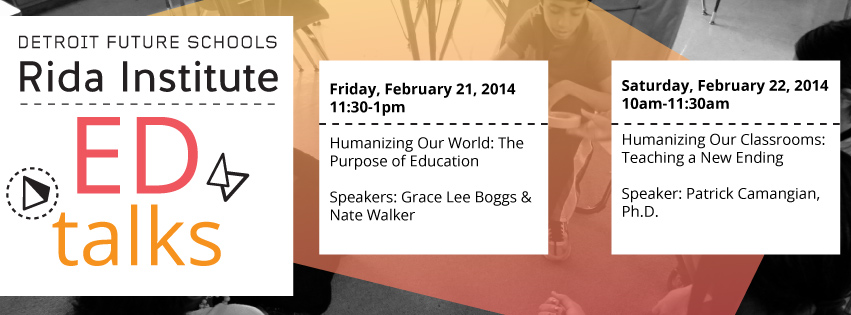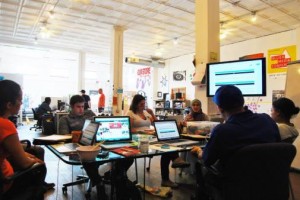This is the first part in a series of blog posts that will highlight lessons emerging from Detroit Future Schools. Our goal is to make our work to humanize schooling in Detroit "open-source" and accessible to other educators. Below, Ammerah Saidi, DFS Program Director, reflects on the process of creating intergenerational relationships between students and adults.
DFS is currently seeking individual sustainers to help keep the work going. Click here to sign up!
WHAT TYPES OF RELATIONSHIPS DO WE NEED TO TRULY TRANSFORM SCHOOLING?
by Ammerah Saidi, DFS Program Coordinator
Currently, schools are designed to foster relationships based on exclusion and top-down power. There are tiers of academic classes ranging from advanced placement to remedial. There are spaces for unruly students that include an in-school suspension room, detention room, and perhaps in more progressive schools there are "reflection rooms" where kids can think about their unruly actions. Even within classrooms there are clearly designated student spaces and teacher spaces. Teacher desks are usually placed near the front of the room with the white/black/smart board behind them. The students have designated spaces centered in a room but usually are not allowed behind the teachers’ desk, in the teacher's cupboard, or in the front of the room without permission. And let us not forget the teachers’ lounge, that sacred island where only teachers are allowed.
On Sunday, December 8, 2013, Detroit Future Schools gathered administrators, teachers, artists, students, and youth support staff across our four anchor schools during our second Quarterly Tune-Up of the 2013-2014 school year. Quarterly Tune-Ups are where the many moving parts of DFS check-in to see what’s working and what’s not, and make adjustments as necessary.
For the Tune-up in December we had the goal of beginning to model the kinds of intergenerational relationships in our program planning process that we wanted to see grow in our classrooms. This was one step in a path towards authentic intergenerational relationships that we’ve been walking since DFS’s inception three years ago. From our failures and successes along that path, here are two things we’ve learned.
1) Holding intergenerational spaces in which all voices are heard requires patience and a willingness to sit with discomfort.
At the December Tune-up we had two seventh graders, one high school student and one third grader in attendance. This was compared to the 12 adults we had around the table. When we would open up the floor for questions or comments, the youth rarely stepped up without being nudged or personally asked to speak. I’ve made it a practice to sit in silence as long as needed in order to let a question land and trust that our collective silence will eventually generate thoughtful responses. When a question was asked directly to one of the youth, a lot of adults would start fidgeting or would want to jump in and sometimes re-ask the question.
The topic of one of the many conversations that day was how to make strategic school-wide change that is humanizing for all people in a school. Even though youth, who make up the majority of school populations, have some of the most critical insights to offer conversations like this, it is rare that school systems ever ask to hear their perspectives. When they do, it is too often a token gesture. For this reason, we should not be surprised that some youth do not feel comfortable exercising their voices in conversations around serious topics with adults. As adults we have to reassure youth that it’s ok to feel uncomfortable and give them space to ask and re-ask questions. Interestingly, the third grader at the DFS Quarterly Tune-up was the most vocal youth participant in the conversation. I have a theory that this is because she’s been in schools the shortest amount of time. She hasn’t spent years in spaces that indirectly or directly prioritize adult voices over youth voices.

2) Schools need systems to normalize and nurture intergenerational relationships
In order to make authentic intergenerational relationships the norm in our schools, we have to rewire classroom culture to value student voices equally with teacher voices. DFS has been developing principles and practices that help to do this. They are simple, but require a level of "grit" to see them through the initial failures – failures that are absolutely necessary on the road to robust learning and transformative classroom culture.
The "80/20 rule" is one such DFS principle that, if normalized within a school, would result in a culture of authentic intergenerational relationships. The 80/20 rule requires that students do 80% of the talking within a classroom and teachers do 20%. This flips the typical power dynamic of the classroom on its head.
In DFS classrooms we put this principle into practice through student-led, self-facilitated debates. We encourage teachers to routinely integrate a self-facilitated debate into their bellwork or do-now activities at least once a week. During a debate, participants are asked to consider a provocative statement, such as "Anyone can learn anything" and then take a physical position on that statement by standing near signs that say "agree", "strongly agree," "disagree," or "strongly disagree," posted around the room. The role of the adult is to keep time and document verbatim what is said during the debate. Students then step up to take ownership over the conversation – or not. The power of this practice lies in the group analysis of the debate transcript after it’s over. Students reflect on what happened from two angles: content and process. They discuss what important points were made, whether they considered ideas from multiple perspectives, . Then they discuss how effectively they used the time, how much time was wasted on jokes or side conversations, how many voices were heard, and they ask "was anyone taking up too much space in the conversation?" and "was anyone not vocal enough?"
Watch a clip of a debate with a DFS classroom in the Davis Aerospace Technical High School:
Debates allow us to discover unfiltered thoughts and perspectives from youth (and ourselves as adults) because of the spontaneous flow of ideas that occur. During one such closing debate at the end of the DFS Quarterly Tune-up, Zoey, our third grade student found herself going back and forth between strongly agreeing and disagreeing with the statement that she herself had posited our group discuss. The statement was: "I love my school." Zoey ultimately ended up on the "agree" side saying, "I love my school and I love Ms. Julia [her principal]...but I just don’t like the homework!" From her statement, we learned that it’s not the new gym equipment or lunches or technology that students value. What brought Zoey to the "agree" side when wondering if she loved her school was her relationship to her principal.
At Zoey’s school, the James and Grace Boggs School, they have applied school-wide practices that support authentic intergenerational relationships. Students are not separated into grades solely based on age. In Zoey’s class, there are three different age groups and they discuss critical concepts with their teacher, Jasmine, and the DFS Teaching Artist, Nate Mullen.
In the Boggs School, students and adults in each class create a code of conduct for the classroom called a "social contract." They return to the social contract repeatedly throughout the year, making it a collective responsibility to live up to their expressed desires for how they will interact with one another. I have also observed a Boggs classroom discuss and analyze the relevance of their social contract as it applies not only in their classroom, but also in the world outside. Students reference the contract as well as teachers, so it is not just up to the adult to "enforce the rules" of how we communicate and relate to one another.
SEE ALSO: Detroit Future Schools on Michigan Radio: "Making school more human"
★ ★ ★ ★ ★ ★ ★ ★ ★
Keep us going and growing: Sign-up to become a DFS sustainer!
Like Detroit Future Schools on Facebook.




 Detroit Future Schools
Detroit Future Schools